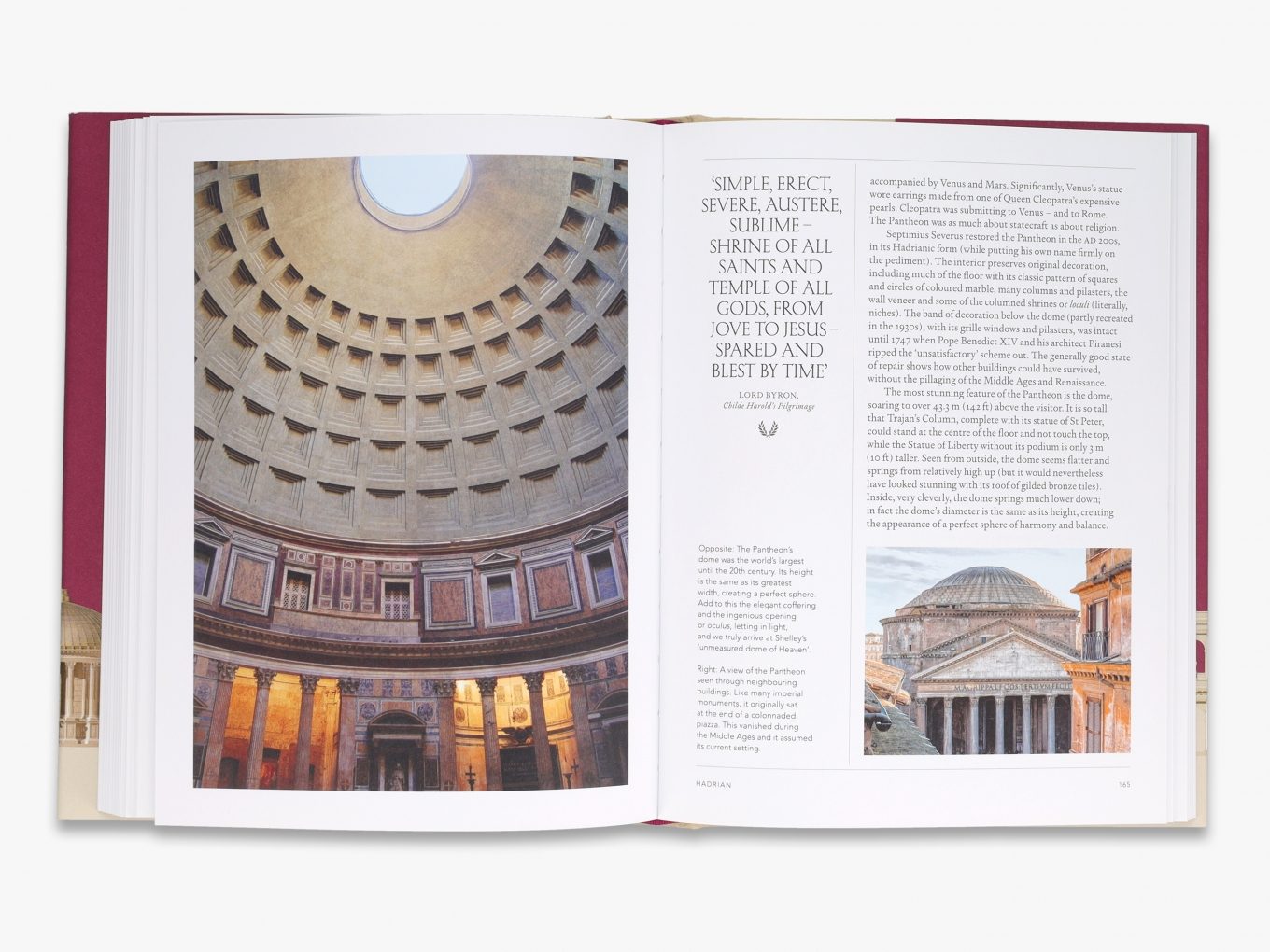EU shipping is temporarily suspended
Ancient Rome in Fifty Monuments
Paul Roberts
£30.00
A sweeping new history of the city of Rome, told through its emperors and the monuments they built to make their mark on one of the great capitals of the classical world
See InsideOverview
‘What is worse than Nero? What is better than Nero’s Baths?’ – so wrote the poet Martial in the first century AD, demonstrating the power that buildings have on public consciousness. In ancient Rome, who built a monument and why mattered as much as its physical structure. Over centuries and under many different emperors, a small village in Italy was transformed into the crowning glory of an empire. Seeking out the personalities behind the great building projects is key to understanding them.
With this firmly in mind, Paul Roberts takes the reader on a tour of ancient Rome, vividly evoking the sights and sounds of the city: from the roar of the crowds at the Circus Maximus and the Colosseum, to the dazzling gleam of the marble- and mosaic-covered baths of Caracalla and Diocletian. He tells this story emperor by emperor, drawing out the political, social and cultural backdrop to the monuments and ultimately the very human motivations that gave rise to their construction – and destruction. These fascinating buildings are further brought to life with reconstructions that show how the ancients themselves would have experienced them.
When and why were these monuments built? What did they add to the lives of the people who used them? What impact did they have on the shape of the city? Roberts expertly weaves together the latest archaeological research with social and cultural history, to tell the story of the Eternal City, always in some way rising, falling and being rebuilt.







Reviews
'Gorgeous'
Natalie Haynes
'Informative and enlightening'
The Irish Catholic
Product Information
Book Details
Format: Hardback
Size: 24.6 x 18.6 cm
Extent: 256 pp
Illustrations: 185
Publication date: 18 April 2024
ISBN: 9780500025680
Contents List
INTRODUCTION: The Monuments That Made Rome
PART I. Beginnings and Regime Change
THE KINGDOM OF ROME
Temple of Jupiter Optimus Maximus
Cloaca Maxima
THE REPUBLIC
Largo Argentina
Temple of Hercules Victor
Tiber Island
Pons Cestius and Pons Fabricius
Republican City Walls
JULIUS CAESAR
Forum of Caesar and its Temple of Venus Genetrix
Curia
Rostra
PART II. From Brick To Marble
AUGUSTUS
Basilica Julia
Temple of Concordia Augusta
Temple of Divus Iulius
Forum of Augustus and its Temple of Mars Ultor
Porticus of Octavia
Theatre of Marcellus
Temple of Apollo Medicus Sosianus
Mausoleum of Augustus
Ara Pacis Augustae
Pyramid of Gaius Cestius
CLAUDIUS
Porta Maggiore
NERO
Domus Aurea (Golden House) and the Colossus of Nero
PART III. New Builders
VESPASIAN
Forum of Vespasian
Colosseum
TITUS
Arch of Titus
DOMITIAN
House of the Vestals
Stadium of Domitian
Forum of Nerva
Palace of Domitian
PART IV. Rome in Glory
TRAJAN
Forum of Trajan
Circus Maximus
HADRIAN
Tenement Building
Temple of Venus and Roma
Pantheon
Mausoleum of Hadrian and Pons Aelius
ANTONINUS PIUS
Temple of the Deified Hadrian
MARCUS AURELIUS
Equestrian Statue of the Emperor Marcus Aurelius
COMMODUS
Column of Marcus Aurelius (the Antonine Column)
SEPTIMIUS SEVERUS
Temple of Vesta
Arch of the Bankers (Arco degli Argentarii)
PART V. An Uncertain City
CARACALLA
Baths of Caracalla
AURELIAN
Walls
DIOCLETIAN
Baths of Diocletian
MAXENTIUS
Basilica of Maxentius
PART VI. From Old to New
CONSTANTINE
Arch of Constantine
San Giovanni in Laterano and San Giovanni Obelisk
LATE PAGAN
Temple of Saturn
Portico of the Harmonious Gods
CHRISTIAN
Santa Maria Maggiore
PHOCAS
Column of Phocas
EPILOGUE: Aftermath
PART I. Beginnings and Regime Change
THE KINGDOM OF ROME
Temple of Jupiter Optimus Maximus
Cloaca Maxima
THE REPUBLIC
Largo Argentina
Temple of Hercules Victor
Tiber Island
Pons Cestius and Pons Fabricius
Republican City Walls
JULIUS CAESAR
Forum of Caesar and its Temple of Venus Genetrix
Curia
Rostra
PART II. From Brick To Marble
AUGUSTUS
Basilica Julia
Temple of Concordia Augusta
Temple of Divus Iulius
Forum of Augustus and its Temple of Mars Ultor
Porticus of Octavia
Theatre of Marcellus
Temple of Apollo Medicus Sosianus
Mausoleum of Augustus
Ara Pacis Augustae
Pyramid of Gaius Cestius
CLAUDIUS
Porta Maggiore
NERO
Domus Aurea (Golden House) and the Colossus of Nero
PART III. New Builders
VESPASIAN
Forum of Vespasian
Colosseum
TITUS
Arch of Titus
DOMITIAN
House of the Vestals
Stadium of Domitian
Forum of Nerva
Palace of Domitian
PART IV. Rome in Glory
TRAJAN
Forum of Trajan
Circus Maximus
HADRIAN
Tenement Building
Temple of Venus and Roma
Pantheon
Mausoleum of Hadrian and Pons Aelius
ANTONINUS PIUS
Temple of the Deified Hadrian
MARCUS AURELIUS
Equestrian Statue of the Emperor Marcus Aurelius
COMMODUS
Column of Marcus Aurelius (the Antonine Column)
SEPTIMIUS SEVERUS
Temple of Vesta
Arch of the Bankers (Arco degli Argentarii)
PART V. An Uncertain City
CARACALLA
Baths of Caracalla
AURELIAN
Walls
DIOCLETIAN
Baths of Diocletian
MAXENTIUS
Basilica of Maxentius
PART VI. From Old to New
CONSTANTINE
Arch of Constantine
San Giovanni in Laterano and San Giovanni Obelisk
LATE PAGAN
Temple of Saturn
Portico of the Harmonious Gods
CHRISTIAN
Santa Maria Maggiore
PHOCAS
Column of Phocas
EPILOGUE: Aftermath
About the Author
Dr Paul Roberts was Sackler Keeper of the Department of Antiquities at the Ashmolean Museum of Art and Archaeology in Oxford. He has curated numerous popular exhibitions, including ‘Life and Death in Pompeii and Herculaneum’ at the British Museum in 2013 and ‘Last Supper in Pompeii’ at the Ashmolean in 2019–20. He wrote the accompanying exhibition catalogues to both. A trained archaeologist, Paul has been involved in various fieldwork projects across Italy and Greece.
